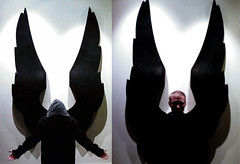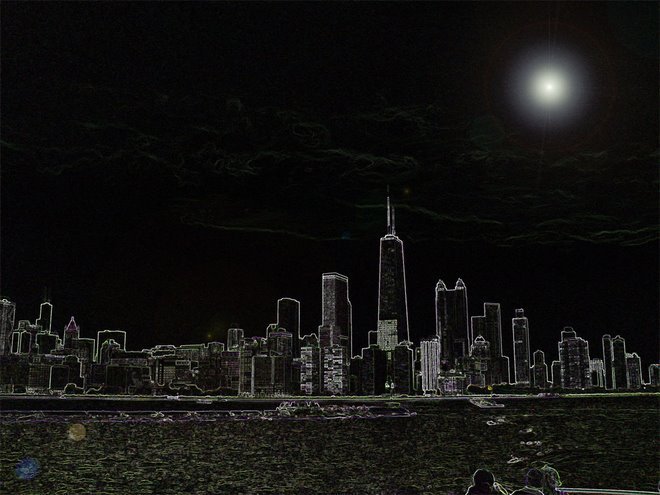skip to main |
skip to sidebar
I seek opinions!
In my LitCrit class, we have been having an ongoing discussion that deals with defining literature. So, since you are all obviously intelligent (you read me, don't you ;p), you tell me: what is literature? Be specific or vague, give examples or not. Let us discuss!


13 comments:
Literature is writing that furthers human understanding.
I'll think about it some more--hopefully, I can come up with specifics.
So does that make scientific lab results literature?
I am not smart enough to need to define 'literature'.
But don't you wanna?
Well, the lab results by themselves don't fall into the category of "furthering human understanding" until someone explains their significance. But if that explanation is well written, I think that could be literature.
There is plenty of scientific and/or academic writing that could, conceivably, be called literature.
Not wanting to is how I know I'm not smart enough.
Where's Stimpy?
Oh, Effin' A. I'm going to get myself in to trouble here.
First off, I would qualify anything written as "literature" in the most basic sense of the word. Yes, your blog is literature. So, frighteningly, is mine.
Secondly, I disagree wholeheartedly with this idea of having a static canon of Literature that Must Be Read In Order To Be Smrt. The idea that a person who hasn't read "Othello" (and I haven't) is somehow less than a person who has is asinine. You have, at this point, turned Literature into a game of poker (not that actually playing poker wouldn’t be more fun). Can I trade in one of my five readings of "Hamlet" for "Othello?" What about a “Hamlet” and a “Romeo & Juliet,” does that some how trump “Othello?” Okay, people, I’ve read “Ulysses,” BEAT THAT.
How many people out there have read "Hamlet" five times? Does that make me any more of an expert that someone who read it well once? No, and it's bullshit that someone WOULD go around thinking like that. THAT is the kind of person who I remind non-stop that I have two degrees in literature. Most of the time, I can't be bothered with such political crap.
So, that said, if you're still going to ask this question, I am going to answer with the following assumptions in mind:
1. You want me to talk about Literature that is Significant and that Smart People read
2. You have somehow already decided that I'm imminently more qualified than the next guy to answer (I’ve read more of it, I should know better)
The easy answer is that a text goes from being “text” to “literature” when it has achieved a culturally (socially) and historically significant status.
Now, ask me to define “significant.” Most of the works people refer to as Literature today are works that were not read during the author’s lifetime. Take Hawthorne, for example: the man died penniless and alone, having sold the rights to his books for food. Why do we read him if no one cared, you ask? Well, the answer is depressing: he sold the rights. We can mass-produce his books for free. And, he’s, like, sorta representative of the times, y’know? Ditto with Shakespeare, Hemmingway, Shelley, Keats… all these Famous and Renowned writers are people you read because they’re (a)free and (b)”traditional,” and GOD KNOWS how much we hate to break with tradition. Just ask any gay person who wants to get married.
So, what is significant? Well, as I mentioned earlier, a book would have to be culturally/socially relevant AT THE TIME IT WAS BEING PUBLISHED AND NOW. If it don’t make no sense now, what good does it do for you to read it except as a relic? What’s relevant now? Fast Food Nation, for sure. Harry Potter. Rich Dad, Poor Dad. These books bring up social issues and center a much-read plot around them. These books make social and political points just as effectively as some of what we’d call “Literature.” These books are having an effect on MILLIONS of readers EVERY DAMN DAY. Why aren’t these books called literature?
Now, here’s the part where I piss off Cara: these books are too new to be called “Literature.” They haven’t been taught in schools for hundreds of millions of years, principals (and other educational authority figures) haven’t approved them to be in classrooms yet, and, um, they’re freakin’ expensive to buy for a classroom. 32 copies of “HBP” @ $36/ea = $1,152, and that’s more than 7 times the usual allotted amount of money a teacher can spend on his/her class. The fact of the matter is that Literature is a growing, changing entity that you’re not likely to pin down in a simple question, or even a five-page paper. The questions you should be asking are: What books are relevant enough to be called Literature in 20 years (remember, that’s a generation of kids that won’t know what a real phone is or who Simon and Garfunkle are)? Which universal themes and social implications of TODAY are going to carry over? What books have I had to read that are totally freakin’ irrelevant to today’s day and age (I’m looking at you, Philip K. Dick… just kidding), and why do I continue to read them?
Riddle me THAT, Batman. Dollars to donuts says that the most inspirational book you’ve ever read is not part of the Canon of Old, Dead White Men, and there’s a problem with that. And if you don’t have a problem with that, you should.
Now, can I go back to reading about Britney Spears’s tummy tuck?
Only if it was written by Norman Mailer.
Good rant, kiddo. I feel honored to host it.
*snorts, pushes back geek glasses* Aw, shucks.
Stimpy said, "The fact of the matter is that Literature is a growing, changing entity that you’re not likely to pin down in a simple question, or even a five-page paper."
I'm not sure why this is supposed to piss me off. I totally agree with you. Even "canon" authors fall in and out of favor as "literature." I also agree that time is an important factor in making such a determination.
However, this doesn't stop people from claiming new books by recently established canonical authors as literature (see Roth, Phillip). Is that valid?
What? No ranting about how Emily Dickens IS relevant and should be read? No lectures about reading canonical authors because they represent the tradition of literature AND WE SHOULD ALL HAVE A STAKE IN THAT? No well-thought-out speeches about how we should all read Hawthorne BEACAUSE HE'S HAWTORNE?
I'm both supremely proud of you and kinda disappointed in you, Cara.
But I have another question now: if you can accept that literature is a living, breathing entity and subject to constant change, what’s your problem with the evolution of language? Why can’t words like “Craptacular” or “Ginormus” be a part of your vernacular? I think they go hand-in-hand toward the evolution of language, literature, culture, and art...
I don't think that Hawthorne should be read anymore than Dan Brown should be read; I do think that exposure to Hawthorne is a necessity since he may hold an influence on our Americanness and on our current authors. Literary tradition is important, but if you approach this from a Marxist standpoint, don't we see how "tradition" can maintain a false consciousness and that the reason most of the canonical literature out there has been written by fairly well-to-do white male authors is so that we may maintain our ignorance of the ideology that causes the most harm to the most people?
Should literature even be taught if the above statement may have even a glimmer of truth? Should we instead be choosing non-canonical literature to read, or simply ingoring the implications of the word "literature" now has and return to the old-world meaning of "that which is written?"
Shit. Blacked out there... Did I say something big-headed?
Stimpy, as I have said many times before, I have no problem with the evolution of language as long as it adds something to the lexicon. Both "craptacular" and "ginormus" offer in one word a nuanced thought that previously required many words to express.
I just don't understand why people use "calendar" as a verb when "schedule" works. I also don't understand why a friend of mine insists on saying "conversate" when he knows that the correct word is "converse." These people are just cluttering up the language.
As for the canon, there's a reason why these works have been around for centuries. They clearly engage readers in the story, despite whatever historical and cultural gaps may exist. However, that doesn't mean that there are specific works that everyone *must* read. My "Bridget Jones" loving sister would get nothing from Hawthorne, but my heavy metal/vampire novel loving friend would.
So, in short, I'm all about efficiency and relevancy.
Post a Comment